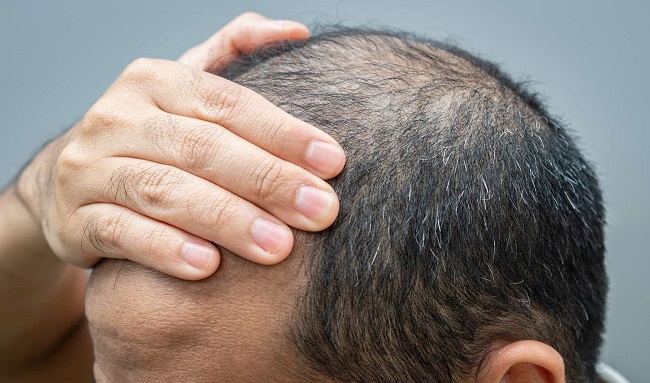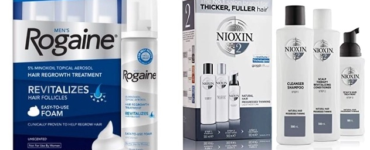Hair loss has become a problem in today’s fast-paced society, impacting not only our physical appearance but also our emotional well-being. Often, we overlook the connection between hair loss and our overall health, despite the factors that can contribute to it. In this blog post, we will explore how hair loss is related to our well-being by examining its effects on our physical state, nutritional deficiencies, stress levels, hormonal imbalances, underlying medical conditions, and potential treatments. Let’s dive into the link between hair loss and our holistic health.
Table of Contents
Hair loss and its impact on health:

Related: Folexin Review
Why is hair loss connected to health?
When we experience hair loss, it could be an indication that there is an issue within our bodies. It might suggest an imbalance or a health problem that requires attention. Understanding the relationship between hair loss and overall health allows us to address the problem effectively and find solutions.
Different types of hair loss can be associated with conditions like alopecia areata, autoimmune diseases, thyroid disorders, and scalp infections. Furthermore, hormonal imbalances during menopause or pregnancy and conditions such as PCOS can exacerbate hair loss.To ensure the regrowth of our hair, it’s crucial to identify and address any medical issues. Dermatologists and trichologists, who specialize in studying hair and scalp disorders, can help determine the root causes of hair loss and recommend treatments.
Effects on Mental and Physical Health from Hair Loss
Hair loss can have both emotional and physical impacts on individuals. It has the potential to affect self-confidence, which in turn influences our connections and overall well-being. It is important to acknowledge and address not only the manifestations of hair loss but also its psychological impact.
Losing hair can significantly impact one’s self-esteem and body image, leading to a decrease in confidence. This may cause individuals to feel more self-conscious, leading them to withdraw from situations, resulting in reduced social interactions. The psychological effects of hair loss include feelings of despair, frustration, and humiliation. Achieving overall well-being requires recognizing the consequences of hair loss and finding ways to address them.
During the journey with the repercussions of hair loss, seeking support from friends or family or joining support groups can be beneficial. Moreover, seeking advice from health experts can offer insights. By addressing not only the aspects but also the psychological effects, individuals can effectively cope with the challenges that come with hair loss.
Read More: Nutrafol Review
The Role of Nutritional Deficiencies in Hair Loss
To keep our hair strong and healthy, it relies on a range of nutrients. Hair loss can occur when there is a lack of minerals and vitamins in our system. Essential nutrients like Vitamin D, E, iron, zinc, and biotin play a role in maintaining health and preventing hair loss.
When our diet falls short on these nutrients, it can contribute to hair loss. Insufficient levels of vitamin D have been associated with hair loss due to its influence on the well-being of hair follicles. Hair loss caused by iron deficiency may be linked to anemia, which is often related to stress. Similarly, a deficiency in zinc can disrupt the process of hair regrowth, leading to shedding. Furthermore, inadequate intake of biotin can also lead to hair loss.
To promote the growth of your hair, it is important to maintain a balanced diet that includes foods rich in vitamins and minerals. Seeking guidance from certified nutritionists or healthcare professionals can be beneficial in identifying deficiencies and providing recommendations for dietary changes or supplements. Remember, the key to keeping your hair healthy is to nourish it with nutrients. So make sure you focus on having a balanced diet to promote optimal hair health.
Stress and Hair Loss
In today’s fast-paced world, stress has become a part of our lives. Unfortunately, it can have consequences for our hair. Excessive stress can trigger a condition called telogen effluvium, where the hair follicles enter a resting phase prematurely, resulting in hair loss. However, there are techniques for managing stress that can help prevent stress-induced hair loss. Engaging in activity, regularly practicing meditation, and taking care of ourselves are ways to combat this issue.
Consistent or prolonged stress can hinder hair regrowth and worsen hair shedding. Telogen effluvium is a disorder associated with stress that leads to hair loss. By incorporating exercise into our routine, we can improve blood circulation. Reduce stress levels, which ultimately supports the regrowth of our hair. Additionally, integrating relaxation techniques like meditation, deep breathing exercises, and mindfulness practices into our lives effectively manages stress. Minimizes its negative impact on our hair’s health.
To effectively manage stress and maintain well-being, it is crucial to prioritize self-care activities that align with our interests while seeking support from loved ones.By taking measures to manage stress and prioritizing self-care, we can protect the health of our hair. Promote its growth.
Hormonal Imbalances and Hair Loss
Unbalances can affect hair loss, such as those that occur during conditions like ovarian syndrome (PCOS), menopause, or pregnancy. These imbalances disrupt the hair growth process, leading to shedding or thinning. To effectively address hair loss, it is crucial to consult with a specialist who can address the hormonal imbalances.
Postpartum hair shedding is a condition characterized by hair loss due to changes during pregnancy and after childbirth. Imbalances associated with menopause can also contribute to hair loss and thinning. Conditions like PCOS can further aggravate hair loss due to imbalances. Seeking guidance is essential in order to identify the root cause of these imbalances and develop a plan for regrowing hair. By doing so, individuals can increase their chances of treating hair loss.
Causes of Hair Loss and Related Medical Issues
Various factors, including thyroid disorders, autoimmune diseases, scalp infections, and alopecia areata, can contribute to hair loss. It is crucial to identify and address these conditions in order to restore hair health.
Hair loss can occur due to thyroid disorders like hypothyroidism and hyperthyroidism. Similar to this, autoimmune diseases like alopecia areata can cause the body to attack the hair follicles, which results in stress-related hair loss. Additionally, scalp infections, like fungal infections or dermatitis, can also play a role in hair loss.
Furthermore, medical conditions like lupus, diabetes, or certain cancers may also result in hair loss. To accurately diagnose and treat the root causes of hair loss, it is essential to seek guidance from healthcare professionals or specialists in hair care.
Treatment options for addressing hair loss may include medications, lifestyle adjustments, or specialized therapies tailored to manage conditions and promote regrowth of hair. Consulting with professionals is vital for tackling the causes of hair loss and finding the most suitable solutions.
Options for Treating Hair Loss
There are approaches available for dealing with the issue of hair loss. Advanced Hair Studio India specializes in offering cutting-edge treatments designed specifically for individuals experiencing hair loss.
Non-surgical methods for restoring hair:
Cutting-edge Laser Therapy: Using low-level laser light, this treatment stimulates the hair follicles. Promotes hair growth. It is a non-option, providing convenience for those seeking treatment. This advanced technique focuses on preserving existing hair and encouraging regrowth, effectively preventing hair loss.
Strand, by Strand Cosmetic Treatment: This cutting-edge technology offers a surgical solution that utilizes real human hair to create the appearance of fuller hair. It is a scar-free method for individuals experiencing hair loss or patchy hair growth.
Options for surgical hair transplantation:
Follicular Unit Extraction (FUE):
FUE is a procedure where individual hair follicles are extracted from donor sites, typically from the back of the scalp, and transplanted to desired areas. This process ensures scarring. Produces natural-looking results.
Follicular Unit Transplantation (FUT):
In FUT, a strip of scalp is removed from the donor area. Then it was divided into individual hair grafts for transplantation. This method is suitable for individuals with hair loss as it allows multiple grafts to be transplanted in a single session. Each graft represents a hair follicle used in the FUT procedure.
Recognizing the connection between hair loss and overall health is crucial to implementing measures. By taking care of our needs, managing stress, maintaining balance, and seeking professional help, we can prioritize our overall well-being in order to have healthy and vibrant hair.






Add comment